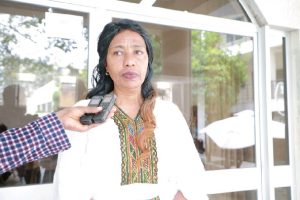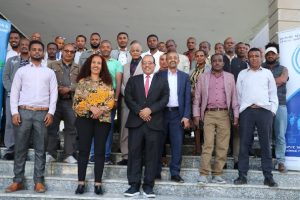
With Ethiopia announcing to table draft roadmap as part of formalizing its relations with Asmara, experts remain optimist on the role of such moves in giving the fledgling economic transaction between the two countries a formal shape and legal base. On Tuesday, Minister of Foreign Affairs, Dr. Wowrkneh Gebeyehu told lawmakers that a draft roadmap has already been prepared to formalize economic activities and would be readily available for discussion. It is also reported that massive transactions have been taking place between the two peoples with the opening of borders that followed the unprecedented rapprochement.
Embassies have been reopened and missions are also deployed in the respective nations to facilitate diplomatic undertakings and formalize the rapprochement. Since then, thousands have crossed respective borders given that the reestablished relation came to the spot light. Later, two borders were closed though official announcements were not made thus far which some attributing it to concerns of alleged illicit transactions. And very recently, the Omahajur-Humera border which connects the two countries through the North-West parts of Ethiopia has been reopened.
Despite their close historical, cultural and social ties between the two peoples, Ethiopia and Eritrea are two sovereign states with individual interests. This necessities the need to come up with formal agreements for the peace deal to take formal shape and steer it in the right track, says Luleseged Girma experts with Foreign Relations Strategic Studies Institute. “Unbalanced and unfair economic relations were the major factors that drove the country into confrontations which later grew into largescale border conflict that brought unimaginable pain to both countries.
” He further elaborates that it was uncontrolled transactions that fractured relations between the two countries in the past times, hence it requires clear roadmap and feasible policies from both governments not only to formalize current economic ties but also convert the rapprochement into economic dividend and contribute to both economies in the future. Agreements must be there but they should consider the geographic, historical and psychological makeup and other aspects of the people living along the borders of the two countries.
There is a need for striking balance between formal agreements and the peoples’ actual desire. Seconding Luelseged’s opinion, Assitant Prof. of Political Science at Mekelle University Yemene Zerai agreed on the need to urgency of formalizing economic transactions. Given the increased obsessions between the peoples of the two countries to be reunited with their loved ones, borders were opened without preconditions and proper legal procedures. Legal element has been missing in the transaction which may result in economic imbalance.
This trend however, as lessons learnt in the past, carries potential causes of disagreements, thus, it is now the time to put in place the proper legal measures to avoid inconveniences that created discord and contributed to border conflicts, he adds. “Particularly the issue of trade and currency must receive great emphasis and services with regard to customs should be legalized.” Any roadmap should also primarily involve religious and community leaders and other actors to make sure that the warming up relations enjoy momentum and flourish more.
People to people ties are where the both countries must put their trust. Peace deal between countries would last long when the people back it and when it has legal system. Preparing the roadmap and realizing it on agreed basis is instrumental to contain illegal arms trafficking and illicit money flow that may result in huge damage in two economies, he explains.
“The roadmap I guess would attach due attention to fostering joint infrastructural projects and economic integrations besides formalizing transactions and customs services,” he states adding,” after all, the two countries enjoy to have sovereignty and it behooves the nations to undertake economic transactions in line with international standards. Ultimately, economic integration is what the countries have to push for by taking different steps. Both countries should also integrate and harmonize their economic interests.
Also, the relations should be scaled up into a point where both countries can align their short term and long term economic goals. It is to be recalled that Ethiopia and Eritrea made peace after Addis Ababa through the Prime Minister Dr. Abiy Ahmed’s extended olive branch and visited Asmara ending the two decades of border conflict that triggered no peace and no war situation.
Herald February 1/2019
BY DESTA GEBREHIWOT





